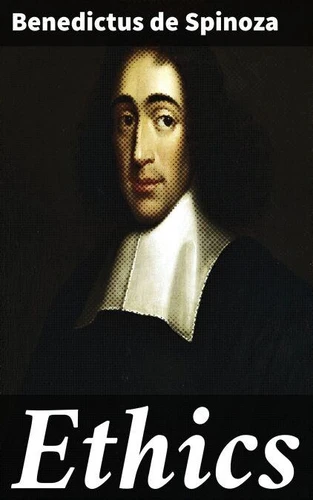Ethics. Exploring Reality, Existence, and Ethics Through Rationalism and Metaphysics
Par : ,Formats :
Disponible dans votre compte client Decitre ou Furet du Nord dès validation de votre commande. Le format ePub est :
- Compatible avec une lecture sur My Vivlio (smartphone, tablette, ordinateur)
- Compatible avec une lecture sur liseuses Vivlio
- Pour les liseuses autres que Vivlio, vous devez utiliser le logiciel Adobe Digital Edition. Non compatible avec la lecture sur les liseuses Kindle, Remarkable et Sony
 , qui est-ce ?
, qui est-ce ?Notre partenaire de plateforme de lecture numérique où vous retrouverez l'ensemble de vos ebooks gratuitement
Pour en savoir plus sur nos ebooks, consultez notre aide en ligne ici
- Nombre de pages208
- FormatePub
- ISBN4057664154118
- EAN4057664154118
- Date de parution19/11/2019
- Protection num.Digital Watermarking
- Taille506 Ko
- Infos supplémentairesepub
- ÉditeurGOOD PRESS
Résumé
In "Ethics, " Benedictus de Spinoza presents a revolutionary philosophical treatise that delves into the nature of reality, the self, and the divine. Employing a geometric method reminiscent of Euclidean principles, Spinoza meticulously constructs his argument to explore the relationship between substance, attributes, and modes, ultimately defining God as synonymous with Nature. This work stands as a cornerstone in the development of rationalist thought and offers profound insights into human emotions, ethics, and freedom, challenging the dogmas of his time and laying the groundwork for Enlightenment rationalism and modern philosophy.
Benedictus de Spinoza, a 17th-century Dutch philosopher of Portuguese Jewish descent, was heavily influenced by the intellectual currents of his time, including Descartes and medieval Jewish philosophy. His background in the Talmudic tradition instilled in him a profound sense of inquiry and skepticism toward orthodoxy, leading him to question prevailing existential beliefs. Spinoza'Äôs excommunication from the Jewish community for his radical ideas only further compelled him to articulate a vision of ethics rooted in reason and naturalism.
"Ethics" invites readers to engage deeply with its systematic approach to understanding existence and moral philosophy. For those interested in the intersections of ethics, metaphysics, and holistic understandings of God and nature, this text remains indispensable. Spinoza'Äôs insights encourage us to pursue a rational ethics of joy and resilience, making this book a vital read for anyone seeking wisdom in the complexities of life.
Benedictus de Spinoza, a 17th-century Dutch philosopher of Portuguese Jewish descent, was heavily influenced by the intellectual currents of his time, including Descartes and medieval Jewish philosophy. His background in the Talmudic tradition instilled in him a profound sense of inquiry and skepticism toward orthodoxy, leading him to question prevailing existential beliefs. Spinoza'Äôs excommunication from the Jewish community for his radical ideas only further compelled him to articulate a vision of ethics rooted in reason and naturalism.
"Ethics" invites readers to engage deeply with its systematic approach to understanding existence and moral philosophy. For those interested in the intersections of ethics, metaphysics, and holistic understandings of God and nature, this text remains indispensable. Spinoza'Äôs insights encourage us to pursue a rational ethics of joy and resilience, making this book a vital read for anyone seeking wisdom in the complexities of life.
In "Ethics, " Benedictus de Spinoza presents a revolutionary philosophical treatise that delves into the nature of reality, the self, and the divine. Employing a geometric method reminiscent of Euclidean principles, Spinoza meticulously constructs his argument to explore the relationship between substance, attributes, and modes, ultimately defining God as synonymous with Nature. This work stands as a cornerstone in the development of rationalist thought and offers profound insights into human emotions, ethics, and freedom, challenging the dogmas of his time and laying the groundwork for Enlightenment rationalism and modern philosophy.
Benedictus de Spinoza, a 17th-century Dutch philosopher of Portuguese Jewish descent, was heavily influenced by the intellectual currents of his time, including Descartes and medieval Jewish philosophy. His background in the Talmudic tradition instilled in him a profound sense of inquiry and skepticism toward orthodoxy, leading him to question prevailing existential beliefs. Spinoza'Äôs excommunication from the Jewish community for his radical ideas only further compelled him to articulate a vision of ethics rooted in reason and naturalism.
"Ethics" invites readers to engage deeply with its systematic approach to understanding existence and moral philosophy. For those interested in the intersections of ethics, metaphysics, and holistic understandings of God and nature, this text remains indispensable. Spinoza'Äôs insights encourage us to pursue a rational ethics of joy and resilience, making this book a vital read for anyone seeking wisdom in the complexities of life.
Benedictus de Spinoza, a 17th-century Dutch philosopher of Portuguese Jewish descent, was heavily influenced by the intellectual currents of his time, including Descartes and medieval Jewish philosophy. His background in the Talmudic tradition instilled in him a profound sense of inquiry and skepticism toward orthodoxy, leading him to question prevailing existential beliefs. Spinoza'Äôs excommunication from the Jewish community for his radical ideas only further compelled him to articulate a vision of ethics rooted in reason and naturalism.
"Ethics" invites readers to engage deeply with its systematic approach to understanding existence and moral philosophy. For those interested in the intersections of ethics, metaphysics, and holistic understandings of God and nature, this text remains indispensable. Spinoza'Äôs insights encourage us to pursue a rational ethics of joy and resilience, making this book a vital read for anyone seeking wisdom in the complexities of life.




